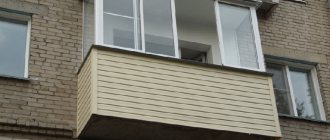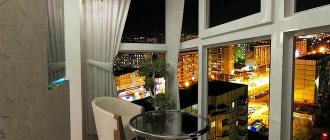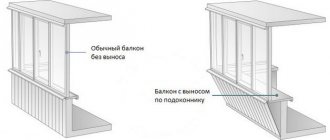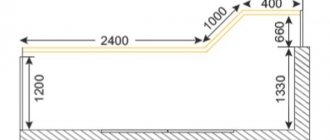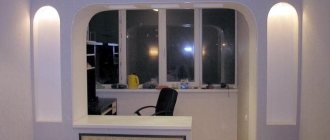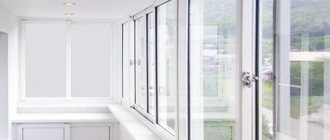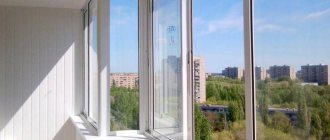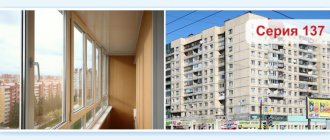Glazing a balcony or loggia is a natural solution for owners of apartments and private houses. Thus, it becomes possible, at a minimum, to protect the apartment from bad weather, precipitation and noise from the street, and, at maximum, to equip a full-fledged living room on additional square meters, thus expanding your living space.
The number of balconies and loggias, according to the Moscow housing stock, is ¾ of the total number.
Permission for glazing is the receipt of permits, which are the basis for starting work and provide for changes to the technical passport of the property.
Do I need permission to glaze balconies and loggias?
Glazing a loggia and balcony, according to most, is not a complicated operation. Many law-abiding citizens do not even think about whether balcony glazing needs to be approved.
It is worth noting that domestic legislation has not developed a clear regulatory framework that would regulate the glazing procedure. Those. There is no law on glazing balconies as a single document in which all questions can be answered.
Currently, you can be guided by the following regulatory documents:
- Housing Code of the Russian Federation; Material prepared for the website www.moydomik.net
- Code of the Russian Federation on Administrative Offences;
- Legislation of the Russian Federation on fire safety;
- Resolution “On approval of the Rules and Standards for the Technical Operation of Housing Stock” dated September 27, 2003 No. 170 (regulates the removal of eaves, low tide, etc.);
- Decree of the Government of the Russian Federation of April 25, 2012 N 390 Moscow “On fire safety regime”;
- GOST 25697-83;
- GOST 26633;
- SNiP 31-01-2003 (developed on the basis of the document SP 54.13330.2016);
- SNiP 2.08.01-89.
Obviously, not the entire area of an apartment and a house has the same legal status.
So, according to Art. 15 h. 4 Housing Code of the Russian Federation:
As you can see, balconies and loggias are not part of the living space. Thus, you need to decide what a balcony and loggia are. SNiP 01/31/2003 contains definitions that reveal the essence of the concepts “balcony” and “loggia”.
Consequently, if they are glazed, insulated, and heated there, they can be used as living quarters. The definition of residential premises is contained in Art. 15 h. 2 Housing Code of the Russian Federation.
Therefore, when planning glazing a balcony, you need to remember that in the vast majority of cases, you need to obtain permission to glaze a balcony in an apartment building.
Is glazing a balcony a redevelopment of an apartment?
Turning to Art. 25 of the Housing Code of the Russian Federation, which contains the definitions of redevelopment and reconstruction, it can be noted that:
Thus, both types of measures to make changes to the balcony require changes to the technical passport of the residential premises, i.e. require permission to glaze a loggia or balcony.
Referring to another regulatory act, namely, the clarification of the Ministry of Construction of the Russian Federation dated April 3, 2006, we can say that:
It turns out that for glazing that does not entail a change in the purpose of the room and destruction of the load-bearing foundations, permission is not required. The exception is the extension of the balcony by more than 300 mm. behind a parapet or load-bearing wall.
Comparing the provisions of these two regulatory documents, it is impossible to say unambiguously whether it is necessary to take permission to glaze a balcony and to what extent it can be transformed (glazing, insulation, removal) without permission.
When is approval for balcony glazing necessary?
There are a number of cases in which obtaining a permit is mandatory, these include:
- increasing the load on the load-bearing slab or other load-bearing structures. This aspect is relevant for Khrushchev, Stalin, old buildings and those buildings whose floor slab is in unsatisfactory condition;
- permission to glaze a balcony with removal. If the extension (expansion) is carried out along the slab or more than 300 mm along the parapet (extension along the window sill);
- blocking access to fire escapes that were installed on balconies in buildings dating back to the 80s and 90s;
- a significant change in the degree of illumination in the room. Sometimes, as an enclosing structure, double-glazed windows are not installed on the balcony, but walls are erected from foam concrete or plastic lining (siding or other facing materials) is installed;
- changing the facade of a building affects the interests of neighbors and causes their displeasure (Article 4 of the Housing Code of the Russian Federation);
- the need to sell real estate. In this case, the data from the technical passport and the actual condition of the housing will be compared;
- the need to use real estate as collateral when obtaining a loan.
The most interesting thing in judicial practice, when they try to legalize an illegally glazed balcony, the court does not always make the same decisions, appealing to different regulatory provisions.
Therefore, today, companies that install glazing on balconies and provide a guarantee for their work are guided by the rule that an increase in the balcony/loggia by less than 300 mm can be done without approval.
In all other cases, including the removal of a balcony on the ground floor, you must have permission in hand before planning to arrange additional space.
However, you need to know how to obtain permission in all other cases.
How to obtain permission for glazing?
The entire procedure for obtaining permission, as well as possible grounds for refusal, are regulated by Articles 26-29 of the RF Housing Code.
What you need to consider when glazing a balcony with a remote:
- neighbors' moods. It would seem, why do you need to interview your neighbors if we are talking about glazing and/or removing a private balcony? But because, according to Art. 4 of the Housing Code of the Russian Federation “reconstruction and redevelopment of residential premises, control over the safety of the housing stock, compliance of residential premises with established rules and regulations” is regulated by housing legislation.
Since the balcony is considered part of the facade, it is part of the common property, which is managed on behalf of all residents. You can obtain permission from residents at a general meeting of apartment owners. Moreover, it is necessary to obtain a majority of votes. The issue is especially acute when the planned expansion takes up a significant part of the local land;Note. If the expansion of the balcony leads to the appearance of gaps, cracks in the walls, residential and non-residential premises, or a decrease in clearance, then the court will oblige the defects to be eliminated and the balcony to be dismantled.
- historical or cultural value of the house. Due to their special value, city authorities rarely agree to make changes to the facade of houses from the historical fund;
- departmental bureaucracy (collection, receipt and provision of certificates, acts and other documents).
What to do after installing glazing
When, after receiving permission, the glazing process is completed, it is necessary to invite employees of the DEZ and employees of the Moscow Housing Inspectorate for inspection. In some situations, the presence of a representative of the district government is also required. If inconsistencies are found, the deficiencies must be eliminated, and then employees of the listed organizations will make a second visit and sign a reorganization act. After this, it is necessary to invite an inspector from the BTI, who, based on new measurements, will make changes to the apartment’s registration certificate.
What documents are needed for glazing?
You can find out what documents need to be provided to approve the glazing of balconies and loggias in Art. 25 Housing Code of the Russian Federation.
Analyzing the excerpt from the code, we can conclude that to obtain permission, you need to prepare the following documents:
- application for redevelopment;
- documents confirming ownership of the apartment;
- balcony project. Ordered from a design organization (licensed) or an architectural bureau of the city;
- letters confirming the consent of neighbors of adjacent apartments (most apartments, for the removal of a balcony on the first floor).
Sometimes you may need to attach the following documents to the main package:
- photographs of the facade where the balcony is located, which is planned to be expanded;
- technical passport of the apartment and building. Ordered from BTI.
What difficulties did the innovation entail?
City residents did not like this measure, and they began to write complaints to local authorities. What did the municipality do?
Pexels Photos
At first, the authorities exempted those who glazed their balconies before January 11, 2022 from fines. However, penalties were still in effect, and management companies continued to look for violators and force them to dismantle the glazing themselves. It is clear that the cost of such a procedure hit the pockets of St. Petersburg residents painfully: they had to shell out hundreds of thousands of rubles. Most of all, the “balcony problem” affected residents of Khrushchev and Brezhnevka apartments.
In March 2022, they decided to adjust the “balcony amnesty” law once again. In particular, an amendment was adopted: although the landscaping rules require approval of glazing, those who glazed the balcony without permission before January 1, 2021 are protected from sanctions. A ten-year moratorium has also been introduced on the requirement to restore the balcony to its original form.
Where can I get permission?
To get approval for the glazing of balconies, it is not enough to collect the necessary documents; you also need to know where to get permission to glaze balconies and loggias.
The entire package of documents is submitted to the Housing Inspectorate. If the project is not rejected, then, together with the issued permit, it “roams” further through the authorities. Permissions from administrative and supervisory authorities will be required, in particular:
- The company that manages the house;
- State examination;
- Rospotrebnadzor (SES);
- State Fire Inspectorate (regional office);
- Department of Cultural Heritage (if the house is recognized as an architectural monument).
You can obtain permission to glaze a balcony in Moscow or St. Petersburg by contacting the “single window service”, the regional branch of the BTI or the Moscow Housing Inspectorate.
If circumstances are successful, you can obtain permission to glaze a balcony within a month.
What fines were planned?
The law not only prohibited unauthorized glazing, but was interesting in that it had retroactive effect. That is, those who carried out work without approval 10, 20, 30 years ago, independently or with the help of companies specializing in glazing, also fell into the risk zone. Even those who bought an apartment with existing glazing were threatened with a fine.
The fine for citizens is from one to five, for legal entities - from 20 to 100 thousand rubles. Moreover, the law directly stated: fines will be imposed exactly until the owner removes the unauthorized construction.
Ban on glazing
The reasons why a glazing permit may be refused are specified in Art. 27 Residential Complex of the Russian Federation
Based on the article of the Housing Code, we can conclude that refusal is possible in the following cases:
- historical value of the house;
- dilapidated structure; Material prepared for the website www.moydomik.net
- unacceptable interference with load-bearing walls (if the intervention may lead to the destruction of load-bearing walls);
- the likelihood of damage to communications when removing the balcony;
- incorrectly developed project;
- lack of proper documents.
- submitting a project to the wrong authority.
The refusal is drawn up and registered in the BTI, of which the person who submitted the application is notified within three days.
Work on removing the balcony along the slab can only begin after the design has been completed successfully, and not at the stage of wandering through the authorities. Otherwise (if permission is not obtained before the start of construction work), the removal of the balcony or extension will be considered illegal. And unauthorized construction is subject to demolition (with some exceptions) by the owner himself or by executive services.
The consequences of unauthorized reorganization are spelled out in Art. 29 of the Housing Code of the Russian Federation and Art. 222 of the Civil Code of the Russian Federation “Unauthorized construction”.
Upon completion of all work, it is necessary, in accordance with Art. 29 of the Housing Code of the Russian Federation, draw up an act of the acceptance committee. The certificate is drawn up in two copies, one of which remains in the hands of the property owner and serves as confirmation of the legality of the actions performed.
Note. Even if you obtain permission, you should remember that you cannot place central heating radiators on the balcony or create a warm water floor connected to the central line, so the heating issue also needs to be resolved separately.
How to legalize a balcony in St. Petersburg?
Balconies are landscaping objects and can only be changed according to an agreed plan. The type of balcony must correspond to the uniform character of the facade, and fulfillment of this requirement is only possible if a landscaping project is developed for the entire facade as a whole.
To receive such a project, the management company of a residential building or a representative of the homeowners must contact the committee.
The approval procedure is as follows:
- Submitting an application from an interested person (review - no more than 30 days);
- Receiving assignments from the committee to develop an improvement project;
- Project approval (no more than 22 days).
Illegal balcony glazing
Responsibility for violation of the law regarding the glazing of balconies and loggias is provided, but it all depends on a number of factors.
Practice shows that this area is poorly controlled by the state, and many owners of remote balconies do not have permission to expand them.
However, it should be remembered that you can use the extension or extended balcony for a long time, but you will not be able to sell, exchange or inherit the apartment without new documents. Plus, neighbors can write a complaint and the result of the decision is unknown.
What kind of unauthorized glazing will happen?
If a standard glazed loggia in an ordinary nine- to sixteen-story building rarely attracts attention, then the significant removal of the balcony glazing is very noticeable, which means that any glazing performed unauthorizedly without permits is punishable:
- a fine of 2-2.5 thousand rubles. (Article 7.1 of the Code of Administrative Offenses of the Russian Federation);
- the requirement to dismantle the glazing (Article 29 of the Code of Life of the Russian Federation);
- forced sale of housing (Article 29 of the Housing Code of the Russian Federation). The proceeds are used to eliminate the consequences of the redevelopment, and the remaining amount is paid to the former owner of the property.
Note. As experts explain, such a decision can be made if the glazing and removal of the balcony caused significant damage to the load-bearing structures of the building, which cannot be eliminated solely by dismantling the glazing.
Please note that there are exceptions. In particular, paragraph 4 of Art. 29 of the RF Housing Code contains information that an unauthorized glazed balcony can be legalized “retroactively.” Namely:
Thus, we can conclude that the glazing of a balcony, and especially its removal, is not regulated by one specific document, but by a whole package of regulations, each of which contains information regulating part of the process.
Moreover, provisions are often mutually exclusive or conflicting. However, it is better to know the procedure for obtaining a permit and possible reasons for refusal before starting work.
